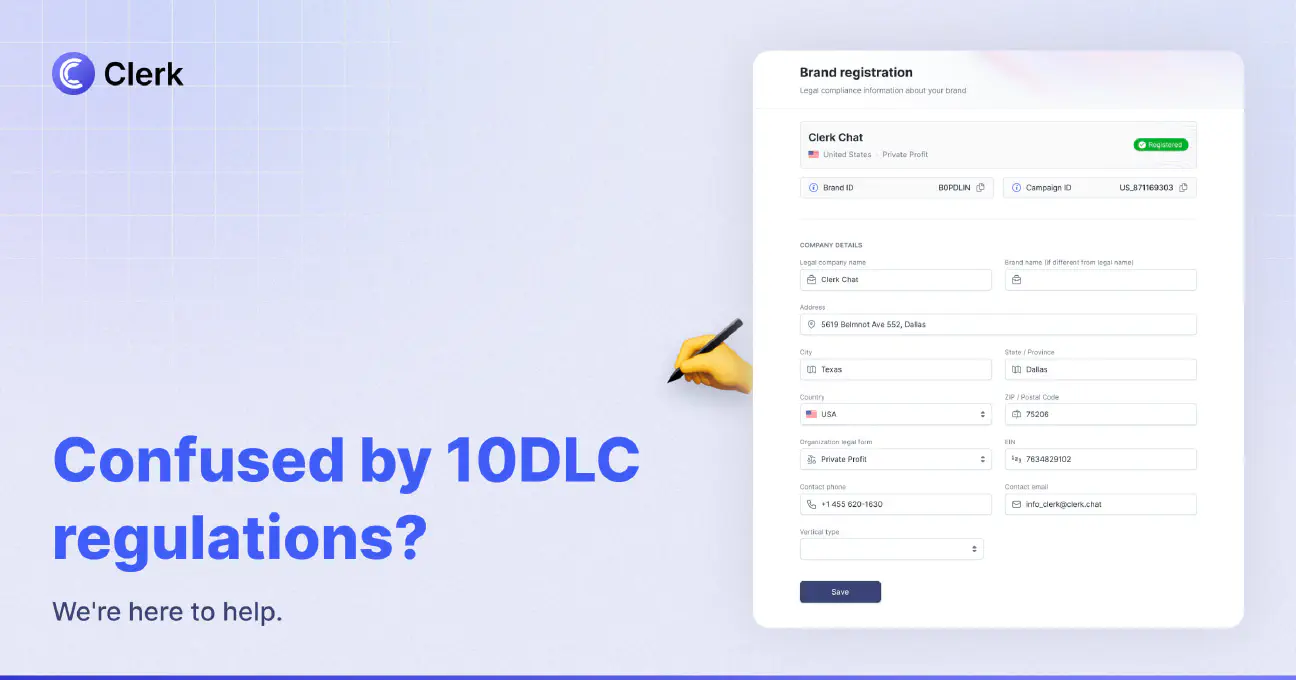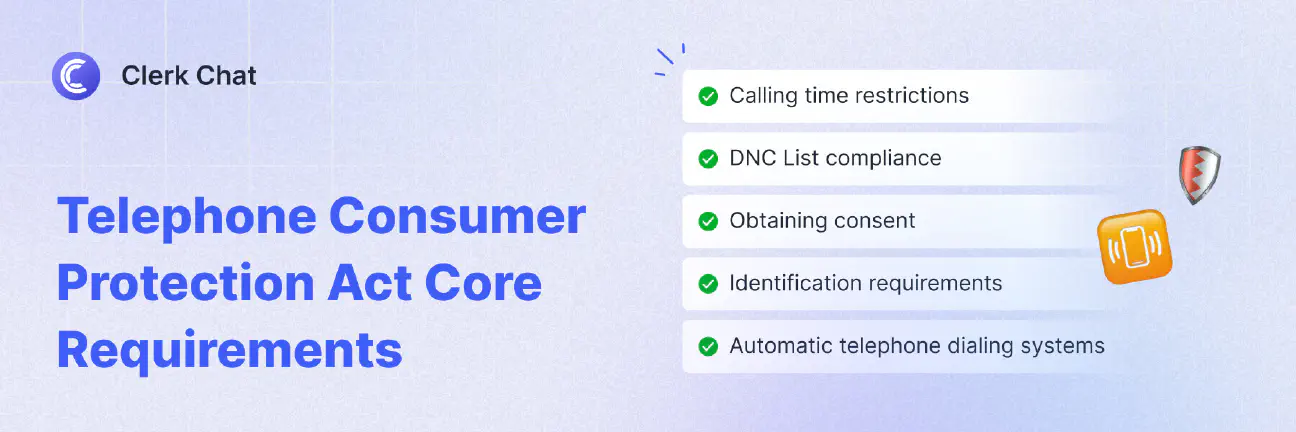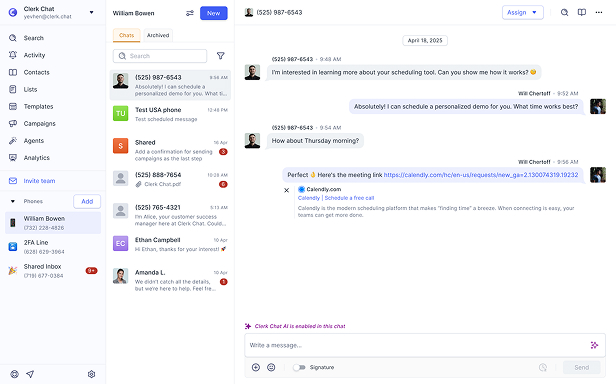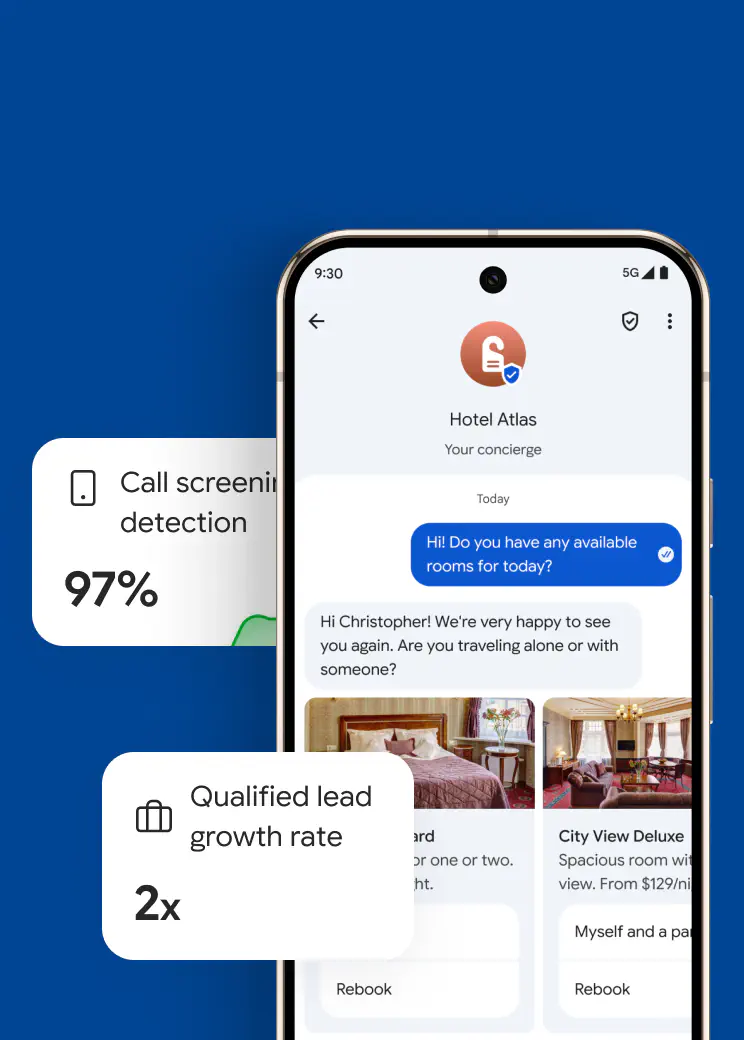TCPA Compliance: The Complete Guide for Businesses
By Team Clerk Chat
- Published: July 8, 2024
Free 10DLC Whitepaper
TCPA compliance is something every business owner needs to prioritize, if they’re communicating with customers using conversational SMS marketing, telephone outreach, or pre-recorded messages.
It applies to every business in the United States, as well as every organization that interacts with US-based customers using phone systems. In marketing communications, TCPA guidelines have become a cornerstone of privacy protection in every industry.
Whether you’re managing a team of financial advisors, or running a retail company, complying with TCPA regulations can protect you from costly penalties.
Maybe even more importantly, the right TCPA compliance strategy can protect your brand’s reputation, and forge stronger relationships with customers.
So, what is TCPA compliance, and how do you implement it into your strategy?
What is TCPA Compliance? The Telephone Consumer Protection Act
TCPA stands for the Telephone Consumer Protection Act, the primary federal law in the United States governing the regulation of telephone solutions. Initially, it was signed into law by President George Bush in 1991. It actually amends the Communications Act of 1934. Since then, further legislation has been introduced, such as the TRACED Act, which aims to reduce the billions of robocalls Americans deal with each year.
TCPA has also influenced various other compliance statutes in the communications space, from 10DLC compliance, to CAN SPAM regulations.
On a broad level, TCPA influences how companies can communicate with customers, using telemarketing, autodialed, and pre-recorded calls, as well as text messages and faxes.
TCPA compliance simply means following the specific rules set, and enforced by the Federal Communications Commission (FCC), and how you interact with your customers.

The Penalties for Breaking TCPA Rules
Issues with TCPA compliance can lead to significant penalties for companies. Even individual customers can bring lawsuits and class actions against companies that don’t comply with rules related to things like SMS opt-in and opt-out clauses.
The minimum standard TCPA fine starts at $500 per violation, and a maximum treble TCPA fine (when you wilfully ignore TCPA rules) can cost you up to $1,500 per violation. If you break the DNC (Do Not Call) list rules when violating TCPA, this can cost up to $43,792 per violation.
According to one report, the FCC even issued a fine worth almost $300 million to an international network of companies issuing robocalls.
The TCPA Regulations: Core Requirements
TCPA compliance requirements have evolved over the years. For the most part, however, there are a few key areas companies need to be aware of when developing communication strategies. These TCPA guidelines apply to all telephone solicitations. This means they cover any telephone call or message used to encourage sales.
Whether you’re using A2P messaging, automated calls, or faxes, you need to adhere to:
- Calling time restrictions: TCPA compliance requires companies and individuals to avoid contacting consumers with solicitations before 8am or after 9pm. This time applies to the time zone of your customer, not your company.
- DNC List compliance: No company is permitted to call or contact a customer who has listed themselves on the Do Not Call List. You must maintain an internal list of consumers who have asked not to be contacted, and track national DNC lists.
- Obtaining consent: Similar to A2P DLC messaging compliance, and CAN-SPAM regulations, TCPA prevents companies from delivering artificial voice calls, recordings, or automated messages to customers without consent.
- Automatic telephone dialling systems: TCPA restricts companies from making autodialed marketing calls, or sending automatic texts to phones without consent. You’re also prohibited from making calls to phones which charge the user for accepting the call.
- Identification requirements: Like 10DLC, TCPA requires companies or callers to provide their name and the name of the company they’re calling on behalf of, as well as a telephone number or contact address that can be used for further interactions.

The Biggest Risks to TCPA Compliance
Although complying with TCPA restrictions might seem simple enough, it’s often tougher than it seems for a few reasons. For instance, reassigned numbers are a common cause of noncompliance. Thousands of numbers are reassigned to new companies every day.
Since the consent you receive from a user to contact them is linked to the called party, rather than the number, there’s always a risk you could reach someone without their consent.
On top of that, many companies struggle to keep track of the consent they receive from customers during email and SMS lead generation strategies. Incorrect or outdated data about customer consent is often the first step towards a TCPA violation.
It’s even difficult to keep track of Do Not Call lists. Consumers are constantly adding their numbers to national DNC registries, but may not remember to “opt out” of conversations with companies.
Do TCPA Guidelines Apply to Everyone?
Technically, TCPA compliance guidelines apply to every company and person in the United States, as well as any person contacting someone located in the United States. However, tax-exempt nonprofit organizations are exempt from certain guidelines, although these organizations still don’t have permission to contact numbers on the national DNC registry.
Certain calls and types of messages aren’t regulated by TCPA either. For instance, automatic emergency calls are exempt from TCPA rules. You also may not need to worry about TCPA rules if you’re sending transactional SMS messages (provided you have consent).
Fundamentally, the rules apply to anything that could be identified as a telephone solicitation. In other words, using messages or telephone calls to encourage the purchase, rental of, or investment in services, goods, or property.
How to Preserve TCPA Compliance
Outdated data, employee mistakes, and countless other factors can lead to inadvertent TCPA violations. That’s why it’s so crucial to have a comprehensive TCPA compliance checklist for your team to follow. Your strategy should focus on the following areas:
1. Obtaining and Documenting Consent
The heart of a strong TCPA compliance strategy is a comprehensive approach to acquiring and documenting consent. You should already be collecting consent for your SMS marketing strategies and automated campaigns to adhere to guidelines for CAN-SPAM text messages and similar rules.
Critically, there are a few different types of consent outlined by TCPA:
- Express written consent: The highest standard of consent required by the TCPA for automated marketing messages.
- Express verbal consent: Another acceptable form of consent, although accurate records are necessary, outlining the date, time, and nature of the consent.
- Implied consent: The consent you receive from customers when they voluntarily engage in a relationship with your company. This form of consent has limitations. For instance, customers need to be able to opt-out easily.
For every form of consent, whether you’re using text to join campaigns or online forms, you need to keep diligent records. This ensures you can prove that you’ve obtained consent, when necessary.
2. Dynamic Record Keeping
Speaking of record keeping, it’s crucial for companies investing in TCPA compliance to keep their information up-to-date. You’ll need to keep track of the customers who submit an SMS opt-out request, or ask you to no longer contact them for marketing purposes.
You’ll also need to ensure that you promptly honor any requests to stop contacting a customer. Don’t start communicating with a customer again until they choose to “opt in” again.
Aside from staying up-to-date with your own opt-in and opt-out data, you’ll also need to keep track of the National Do Not Call registry. This list outlines all of the people who have opted out of receiving any form of telephone solicitation from companies.
You can usually find tools that enable you to automate monitoring this system, and update your DNC lists in real-time, to reduce the risk of violations.
3. Be Cautious with Automated Outreach
TCPA guidelines require companies to adhere to a variety of different guidelines when it comes to automatically communicating with customers.
For instance, if you use robocalls and auto-dialler software to communicate with customers automatically, you’ll need to ensure you’re following TCPA regulations carefully.
Don’t contact customers that haven’t opted-in to automatic messages, and avoid contacting customers at the wrong times. Telemarketing calls cannot be placed to residential phone numbers before the hours of 8am or after the hours of 9pm to ensure TCPA compliance. These time rules apply to the local time zone of your customer, so it’s important to ensure you keep track of the locations of global or national clients.
Consider implementing automation strategies that can help to restrict calls that might be issued at inappropriate times. Additionally, remember that while TCPA rules don’t explicitly prohibit telemarketing calls from being made during holidays or weekends, you are required to use your discretion and avoid contacting customers when they may not be available.
4. Be Wary of Caller ID Requirements
Transparency is an important factor in TCPA compliance, and following caller ID regulations help you to show greater transparency to your customers. Similar to the rules set out by the Telemarketing Sales Rule (TSR), TCPA requires companies to transmit identifying information when communicating with a customer.
Where possible, invest in 10DLC brand registration, to ensure you can automatically identify your company for customers, and share crucial contact and business information.
If you change your messaging or communication strategy, use phone porting to maintain approved, registered numbers that will help you foster trust and build positive relationships with customers.
5. Leverage Technology and Training
Ensuring TCPA compliance requires a comprehensive approach. First, you’ll need to develop a comprehensive compliance policy and share the details of that policy with your team members. Train your employees on TCPA regulations, compliance requirements, and methods for ethical communication. Make sure they know how to obtain consent and honor opt-out requests.
Conduct regular audits, using quality assurance technology and analytical tools, to pinpoint blind spots in your compliance plan. Additionally, make sure you’re leveraging technology that can help you to maintain and document crucial data.
Tools like Clerk Chat, which offer features to personalize text messages, automate outreach, and enhance customer service will give you in-depth insights into your communication strategy. You can even use SMS integrations for a holistic approach to record keeping across multiple channels.
Ensure TCPA Compliance with Clerk Chat
TCPA compliance is something no company can afford to overlook. If you connect with customers through texts, faxes, or automated calls, you need to ensure that you’re adhering to the regulations that protect their rights and privacy.
Not only is this essential to avoiding hefty fines, but it’s also important to ensure you can preserve positive relationships with your target audience.
With Clerk Chat, companies can take a strategic approach to compliance management, prioritizing archiving, record keeping, consent acquisition and more.
Avoid the damage caused by TCPA violations. Use Clerk Chat to securely optimize your messaging strategy.
In this article:
Ready to use your business number for text messaging?
Thousands of businesses are already experiencing the power of conversational messaging through SMS. Join us. Free trial and paid tiers available.
Get Started#Subscribe
Get product updates in your inbox
Tutorials, features, and Clerk Chat news delivered straight to you.



